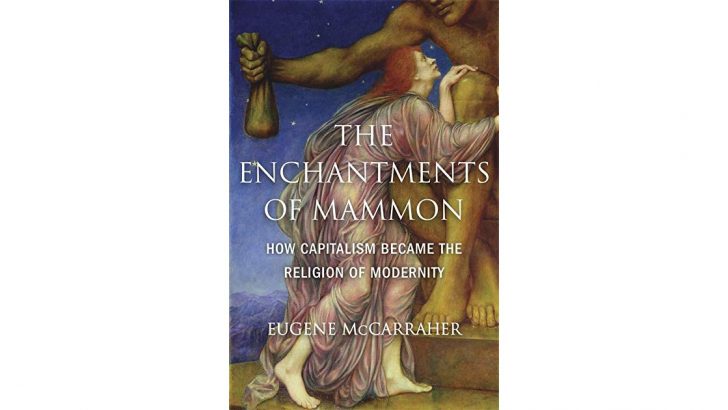The Enchantment of Mammon: How Capitalism became the Religion of Modernity
by Eugene McCarraher (The Belknap Press / Harvard University Press, $US39.95/£31.95)
Frank Litton
This is a vitally important book, likely to attract considerable attention among critics and readers. I reckon it could have an impact similar to Alasdair MacIntyre’s After Virtue back in 1997. Certainly it is a book people concerned about the state of the world and moral theology should be aware of.
We live in a disenchanted world. Both believers and secularists agree, at least on this. While the believer laments the fact, the secularist rejoices that superstition has been vanquished along with the oppressive hierarchies that it sustained. Both are wrong.
This is the message of this important book: religion has not departed from the western world. Eugene McCarraher, associate professor of the humanities at Villanova University explains how capitalism has become the religion of the modern world.
What does religion mean in this context? Religions are ubiquitous. All societies have their theologies and liturgies that place us in a world where the transcendent promises salvation and communion.
McCarraher makes clear the importance of advertising in recounting how it was understood”
McCarraher documents the considerable efforts that have been made to sanctify the capitalist order, promoting it as the best hope of our fulfilment. His focus in on the US where capitalism found its greatest welcome and most secure home.
An impossible task as the followers of the Catholic tradition of social thought must suppose. They will, for example, have learnt from Frederic Ozanam, founder of the society of St Vincent de Paul, how workers were compelled to live close to destitution while the fruits of their labours enriched the few. Chesterton and Belloc will have instructed them in how the exigencies of factory production denied workers the opportunity for creative self-expression through work in companionship with their fellows while the conflicts inherent in capitalism together with the inequalities in power that it generated distorted and weakened democracy.
Dorothy Day and the Catholic Worker movement shows them, in their thought and practice of charity, the distance between the imperatives of capitalism and the Gospels.
Herbert McCabe OP, a preeminent English-speaking theologian of the twentieth century teaches them how capitalism negates the account of human flourishing found in Aquinas.
The list could be extended and the voices from other traditions introduced. McCarraher gives them all their due. He reports, however, that they have been drowned out, sidelined, by stronger voices, more pleasing to the powerful.
McCarraher guides the reader with wit and insight through an immense amount of material, never losing control of the narrative. Nonetheless the book, which runs to 679 pages, excluding notes, is a daunting read. It defies ready summary. I extract three points to indicate something of how capitalism found transcendence, promises salvation and aspires to communion.
Not all religious traditions shared the Catholic perspective. The Puritans, so important in shaping the religion and culture of the US, found in their reading of Christianity good reason to support the capitalist dynamic. Profit was clear evidence that one was doing God’s work.
Dissonance
So the dissonance between God and Mammon was reduced and their religion’s transcendence seeped into capitalism endorsing the motives that drove it onwards. McCarraher traces the complicated route whereby the same religious sensibility shaped the individualism that is an essential ingredient of the capitalist ethos.
McCarraher makes clear the importance of advertising in recounting how it was understood and practised. Its role goes far beyond supplying the information that markets require. It makes ‘sacraments’ of products endowing them with the power to transform your life.
This detailed account of the idolatries of our age deserves wide readership”
So a soft drink does more than sate your thirst with its pleasant taste, it transports into a colourful social whirl. This motor car does more than transport you from A to B in safety, it transforms you into an adventurer, brave and strong. Watch an evening’s TV and count the number of enchantments on offer, promising salvation through consumption.
Capitalist enterprises commend themselves as ‘scientific’ and ‘rational’. Frederick W. Taylor exemplifies such claims. He believed, with religious fervour, that technology could break down the divisions between management and workers. His ‘scientific management’ would resolve all conflicts, transforming a zero-sum game into a ‘win-win’ where all could find communion in profitable service to the corporation. If his promise of communion found few takers among the bosses, his scientific management did provide a useful tool for the supervision and control; of workers.
He was among the first in a long line of management ‘thinkers’ surveyed in the book, whose rhetoric, clothed in the appearance of science, sought to convince managers that the business of controlling their fellows in the interests of profits was ‘professional’ with the promise of self-fulfilment.
Their work continues. Next time that you are in an airport check out the shelves of management books and discover the diverse ways in which service to Mammon is purveyed as a spiritual good.
So superstition and oppressive hierarchies have not gone away.
This detailed account of the idolatries of our age deserves wide readership and detailed examination. It surely will encourage believers to preach the gospel where our true God is found, salvation promised and real communion established.


 photo: goodreads.com
photo: goodreads.com 